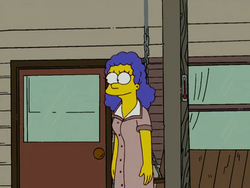
Difference between revisions of "Bonnie Parker"
m |
|||
| Line 1: | Line 1: | ||
| − | |||
{{Character | {{Character | ||
|name = Bonnie Parker | |name = Bonnie Parker | ||
| Line 20: | Line 19: | ||
==Non-canon== | ==Non-canon== | ||
{{Noncanon}} | {{Noncanon}} | ||
| − | In 1933, during the Great Depression, Bonnie Parker rejects a man trying to get her attention, saying she is looking for someone exciting. [[Clyde Barrow]] then arrives, and after robbing a store, the two run off. Clyde discovers Bonnie's passion is violence, and the two go on a crime spree by robbing banks. After tricking a citizen into helping them, the two garner intense popularity in the country for and they got a radio show named after them. The citizen they tricked soon realizes what had happened, and snitches to the police. The Louisiana officers soon arrive, and the cops gun Bonnie and Clyde down. While dying, Bonnie tells Clyde that she is looking for a man with more excitement, and that they would never have been together.<ref>"[[Love, Springfieldian Style]]</ref> | + | In 1933, during the Great Depression, Bonnie Parker rejects a man trying to get her attention, saying she is looking for someone exciting. [[Clyde Barrow]] then arrives, and after robbing a store, the two run off. Clyde discovers Bonnie's passion is violence, and the two go on a crime spree by robbing banks. After tricking a citizen into helping them, the two garner intense popularity in the country for and they got a radio show named after them. The citizen they tricked soon realizes what had happened, and snitches to the police. The Louisiana officers soon arrive, and the cops gun Bonnie and Clyde down. While dying, Bonnie tells Clyde that she is looking for a man with more excitement, and that they would never have been together.<ref>"[[Love, Springfieldian Style]]"</ref> |
== Behind the Laughter == | == Behind the Laughter == | ||
| Line 36: | Line 35: | ||
[[Category:Characters voiced by Dan Castellaneta]] | [[Category:Characters voiced by Dan Castellaneta]] | ||
[[Category:Deceased characters]] | [[Category:Deceased characters]] | ||
| − | [[Category: | + | [[Category:Recurring characters]] |
[[Category:Real world characters]] | [[Category:Real world characters]] | ||
[[sv:Bonnie Parker]] | [[sv:Bonnie Parker]] | ||
Revision as of 08:56, January 1, 2012
Bonnie Parker
| ||||||||||||||
Character Information
|
Bonnie Parker was a criminal with Clyde Barrow and appears in a story by Homer Simpson.
History
Bonnie is with Billy the Kid, Clyde Barrow and Jesus those who in American is praised after they died.[1]
Non-canon

|
The contents of this article or section are considered to be non-canon and therefore may not have actually happened or existed. |
In 1933, during the Great Depression, Bonnie Parker rejects a man trying to get her attention, saying she is looking for someone exciting. Clyde Barrow then arrives, and after robbing a store, the two run off. Clyde discovers Bonnie's passion is violence, and the two go on a crime spree by robbing banks. After tricking a citizen into helping them, the two garner intense popularity in the country for and they got a radio show named after them. The citizen they tricked soon realizes what had happened, and snitches to the police. The Louisiana officers soon arrive, and the cops gun Bonnie and Clyde down. While dying, Bonnie tells Clyde that she is looking for a man with more excitement, and that they would never have been together.[2]
Behind the Laughter
- Bonnie in Love, Springfieldian Style is based on Homer Simpson's character.

